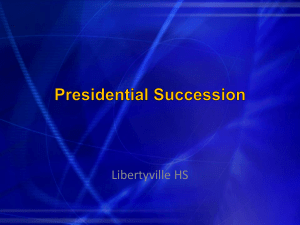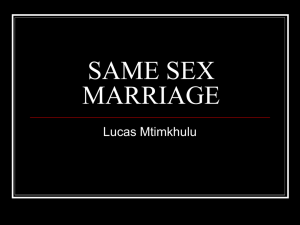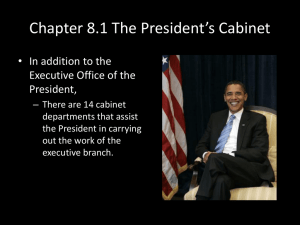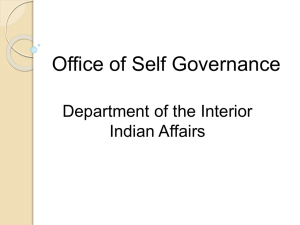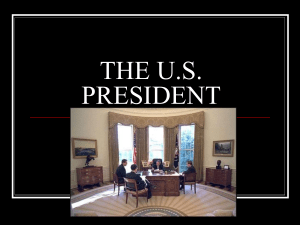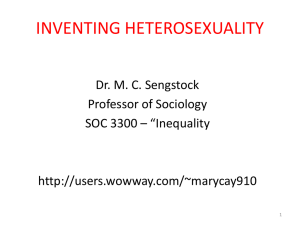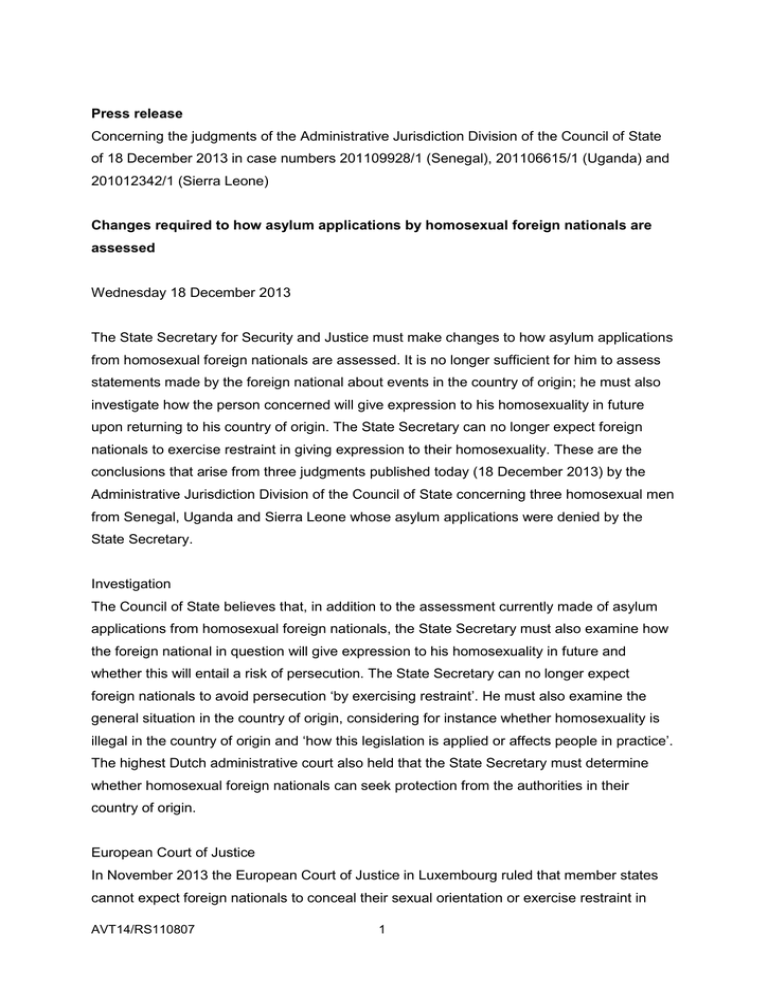
Press release
Concerning the judgments of the Administrative Jurisdiction Division of the Council of State
of 18 December 2013 in case numbers 201109928/1 (Senegal), 201106615/1 (Uganda) and
201012342/1 (Sierra Leone)
Changes required to how asylum applications by homosexual foreign nationals are
assessed
Wednesday 18 December 2013
The State Secretary for Security and Justice must make changes to how asylum applications
from homosexual foreign nationals are assessed. It is no longer sufficient for him to assess
statements made by the foreign national about events in the country of origin; he must also
investigate how the person concerned will give expression to his homosexuality in future
upon returning to his country of origin. The State Secretary can no longer expect foreign
nationals to exercise restraint in giving expression to their homosexuality. These are the
conclusions that arise from three judgments published today (18 December 2013) by the
Administrative Jurisdiction Division of the Council of State concerning three homosexual men
from Senegal, Uganda and Sierra Leone whose asylum applications were denied by the
State Secretary.
Investigation
The Council of State believes that, in addition to the assessment currently made of asylum
applications from homosexual foreign nationals, the State Secretary must also examine how
the foreign national in question will give expression to his homosexuality in future and
whether this will entail a risk of persecution. The State Secretary can no longer expect
foreign nationals to avoid persecution ‘by exercising restraint’. He must also examine the
general situation in the country of origin, considering for instance whether homosexuality is
illegal in the country of origin and ‘how this legislation is applied or affects people in practice’.
The highest Dutch administrative court also held that the State Secretary must determine
whether homosexual foreign nationals can seek protection from the authorities in their
country of origin.
European Court of Justice
In November 2013 the European Court of Justice in Luxembourg ruled that member states
cannot expect foreign nationals to conceal their sexual orientation or exercise restraint in
AVT14/RS110807
1
their country of origin to avoid the risk of persecution. In its judgment the European Court
gave a preliminary ruling on questions referred to it by the Council of State in April 2012
concerning the Qualification Directive, which lays down minimum standards for the protection
of refugees in member states.
New decisions
The State Secretary must take new decisions on the three foreign nationals’ asylum
applications, taking into account the judgments of the Council of State. The judgments will
also have implications for how the State Secretary assesses asylum applications from
lesbian, bisexual, transsexual and intersex individuals.
Decisive considerations from the judgment
[…]
6.
In its judgment of 13 August 1981 in case no. A-2.113 (RV 1981, no. 5) the former
Administrative Jurisdiction Division of the Council of State observed that persecution within
the meaning of the Refugee Convention for belonging to a particular social group may
include persecution on the grounds of sexual orientation. Since then the State Secretary has
adopted this as a general policy principle. In its judgment the European Court identified
foreign nationals with a homosexual orientation as a particular social group within the
meaning of the Qualification Directive.
7.
According to considerations 34 and 63, the judgment concerns those cases in
which the State Secretary regards the sexual orientation of the foreign national as credible,
but adopts the stance that the foreign national’s statements on what happened to him in his
country of origin, allegedly on the grounds of his sexual orientation, are not credible and this
stance has withstood review by the courts. This means that the foreign national in question
cannot rely on the events alleged in his account in support of his asylum application to
establish a well-founded fear of persecution. In considerations 58 to 60 and 71 to 76, the
Court describes how to assess whether such a foreign national has a well-founded fear of
persecution within the meaning of article 9 (1) of the Qualification Directive on the grounds of
his sexual orientation. The judgment does not therefore concern foreign nationals whose
sexual orientation was not regarded as credible or foreign nationals who claim to be
regarded as homosexuals by the authorities in their countries of origin or the surrounding
society despite their own assertions to the contrary.
AVT14/RS110807
2
8.
When applied to the Dutch system of administrative law, the assessment to be
made by the State Secretary, in which in the light of section 3:2 of the General Administrative
Law Act (Algemene wet bestuursrecht) he examines the general situation of homosexual
foreign nationals living in the country of origin and considers the statements made by the
foreign national during his interviews, is as follows.
8.1.
To deny an application for an asylum residence permit it is insufficient that the
State Secretary does not regard the events alleged to have taken place in the country of
origin by a foreign national with a homosexual orientation as credible. In assessing whether a
foreign national has a well-founded fear of persecution, the State Secretary must also take
into account the foreign national’s statements on how he will give expression to his sexual
orientation upon returning to his country of origin, or why he will be refraining from doing so
(see paragraph 82 of the judgment of the Supreme Court of the United Kingdom of 7 July
2010 in case no. [2010] UKSC 31; www.supremecourt.gov.uk). In assessing the plausibility
of a foreign national’s statement that he will give expression to his sexual orientation in a
particular way following his return, the State Secretary must take into account the situation of
homosexuals and the acceptance expected for such a course of action in the country in
question. If a foreign national asserts that following his return he will give expression to his
sexual orientation in a manner that exposes him to persecution, the plausibility of this
statement will be affected by whether it is consistent or inconsistent with his statements
about the way in which he previously gave expression to his sexual orientation in the
Netherlands or elsewhere (see paragraph 24 of the judgment of the Federal Administrative
Court of Germany of 20 February 2013 in case no. BVerwG 10 C20.12
(ECLI:DE:BVerwG:2013:200213U10C20.12.0)).
8.2.
If in a foreign national’s country of origin there is legislation criminalising
homosexuality or the performance of homosexual acts, the State Secretary must examine
how this legislation is applied or affects people in practice. This examination must also
address whether merely being homosexual or performing homosexual acts gives rise to a
well-founded fear of persecution. It must address not only the question of whether the
application of these provisions does in fact lead to the imposition of custodial or other
sentences, but also any investigation by the police or criminal justice authorities prior to
sentencing and the implications of criminalisation for the social position of homosexuals. The
State Secretary must also consider whether homosexuals can seek protection from the
authorities when faced with hostile treatment from third parties. It is not inconceivable that
the mere fact that being homosexual or performing homosexual acts has been criminalised
will make the authorities unable or unwilling to offer homosexuals protection, in other words
AVT14/RS110807
3
that asking for protection may be deemed dangerous or useless from the outset (see the
judgment of the Administrative Jurisdiction Division of 28 March 2012 in case
no. 201101753/1/V2; www.raadvanstate.nl). In making this assessment the State Secretary
must disregard whether a foreign national can escape persecution by exercising restraint.
9.
In assessing whether it was reasonable for the State Secretary in making his
assessment to have taken the position that the foreign national has failed to establish
satisfactorily that he has reason to fear persecution on the grounds of his sexual orientation
in his country of origin, the district court therefore wrongly attached sole importance to the
fact that the foreign national’s statements on the events that had taken place were not
credible, as a result of which it was not plausible that he feared persecution upon return.
10.
The appeal is well founded. The contested judgment must be set aside. The
foreign national’s other arguments require no discussion. Doing that which the district court
should have done, the Division holds as follows.
11.
In the decision of 12 January 2011, in assessing whether the foreign national had
reason to fear persecution on the grounds of his sexual orientation, the State Secretary took
into account only the fact that the foreign national’s statements concerning the events that
had taken place according to the account in support of his asylum application were not
credible and that it was implausible that others were aware of his sexual orientation. The
State Secretary made no assessment of the way in which the foreign national will give
expression to his sexual orientation following his return and the extent to which he has
reason to fear persecution on that basis. For this reason alone the State Secretary did not
make his assessment in the manner described above.
12.
The application for judicial review is well founded. The decision is annulled.
AVT14/RS110807
4


